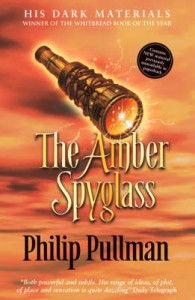Amber, Subtle and Golden

I finally finished the third in the trilogy and what an odd trilogy it was.
The Golden Compass started out as a straightforward fantasy novel for children borrowing heavily from Christian mythology with some witches and armoured bears for local colour.
The thing about the daemons was a nice touch. Gave a good excuse to direct the inner dialog outward.
Lyra was likable enough and the good versus evil climax was rip-roaring fun and one can never have too much steampunk.
So far so good. On to book two.
That’s where things got a little weird.

For a start, it was very dark with few of the glimpses of beauty from the first book.
But he still told it like a kid’s story as the story got darker and darker and the mythology more baroque. He added layer upon layer of mythology – as though trying to out-Silmarillion Tolkien – and finally lost me. The only constants were Lyra’s mysterious destiny and the wickedness of the magisterium.
The third book was just silly. It was like he had all these leftover mythical scraps from other fantasies and he had to use them all up before they went bad.
The effect was not unlike listening to a small child describe a poorly-remembered dream. Good becomes bad. Bad becomes good. New myths are introduced right to the very end and old ones just fizzle into nothingness.
Did not like.
 It might have been yet another case of mis-set expectations. The word on the street was that it was a child’s novel with atheism as its theme but it was the opposite of that. It’s hard to imagine a novel with more supernatural elements.
It might have been yet another case of mis-set expectations. The word on the street was that it was a child’s novel with atheism as its theme but it was the opposite of that. It’s hard to imagine a novel with more supernatural elements.
Even Prince Caspian’s “You should believe in me especially when there is no evidence” was only slightly less biblical.
Re-reading some of the reviews and interviews with Philip Pullman now, I wonder if he – or his agent – was just trying to cash in on the success of The New Atheists.
Makes me wonder what atheist novel would even mean.
